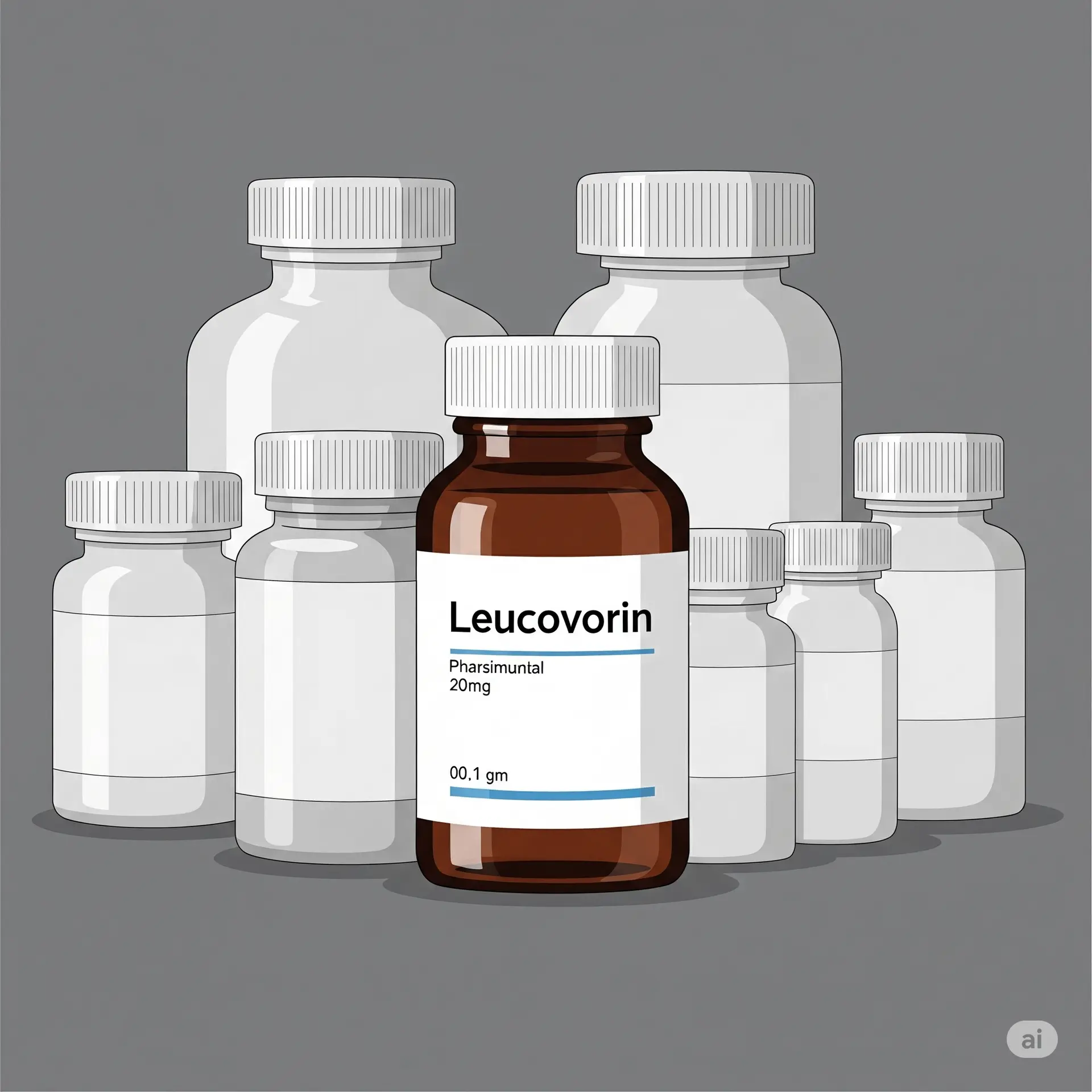When it comes to supporting children with autism spectrum disorder (ASD), parents are often looking for the best possible treatments and supplements to support their child’s development. Among the many options available, leucovorin and folinic acid supplements are two forms of 5-formyltetrahydrofolate, the active form of folate. While both provide the same active compound, there are significant differences in how these two options are used and why one might be more suitable than the other for specific needs.
It’s important to note that leucovorin is not FDA-approved to treat autism, and its use in this context is still being researched. However, when considering treatment options that involve folate supplementation, leucovorin may offer certain benefits over standard folinic acid supplements, especially in cases requiring higher doses or more controlled use.
In this blog, we’ll explore why leucovorin, a pharmaceutical-grade form of folinic acid, may be a better option than folinic acid supplements in certain cases, particularly when addressing severe folate deficiencies or other medical needs.
Not sure if leucovorin is right for you? Read our guide on why Las Vegas patients start with a psychiatric consultation first.
Understanding Leucovorin vs. Folinic Acid Supplements
Before diving into the potential benefits of leucovorin, it’s important to understand the difference between leucovorin and folinic acid supplements:
- Leucovorin: This is a pharmaceutical-grade form of folinic acid (5-formyltetrahydrofolate), used primarily for medical treatments like chemotherapy rescue or addressing severe folate deficiencies. It is typically available in higher doses and is administered under medical supervision, either as an oral tablet or injectable form.
- Folinic Acid Supplements: These are over-the-counter products that provide lower doses of 5-formyltetrahydrofolate and are usually used for general nutritional support or addressing mild folate deficiencies. They are typically available in tablet or capsule form and do not require a prescription.
Why Leucovorin Might Be a Better Choice Than Folinic Acid Supplements
1. Higher Potency for Medical Needs
Leucovorin is available in higher doses than folinic acid supplements. This makes it a better option in cases where higher doses of folate are needed, particularly if your child has severe folate deficiencies or specific biochemical abnormalities. While folinic acid supplements are often used for general wellness and mild deficiencies, leucovorin provides a more potent and effective solution for addressing medical conditions that require more significant doses of folate.
2. More Effective for Severe Folate Deficiency
Folate is essential for many bodily functions, including cell division and brain development. Some children with autism may experience mild to moderate folate deficiencies. While folinic acid supplements can help with general health, they may not provide the same level of potency needed for treating more severe deficiencies.
Leucovorin, with its higher doses, is designed to address significant deficiencies and is often used in clinical settings to restore folate balance rapidly. For children with autism who might be experiencing folate-related metabolic issues, leucovorin may offer a more effective solution than over-the-counter supplements.
3. Controlled Dosing and Medical Supervision
Leucovorin is prescribed and administered under medical supervision, allowing healthcare providers to tailor the dosage based on the specific needs of your child. This ensures that your child receives the right amount of folate to address their individual health needs, particularly if more precise dosing is required.
In contrast, folinic acid supplements are typically taken without medical oversight, which may lead to inconsistent dosing or potentially ineffective results. When leucovorin is used in higher doses, it is done so with proper guidance to ensure the safety and effectiveness of the treatment.
4. Support for Complex Health Needs
Autism treatment often involves a multidisciplinary approach, including dietary changes, therapy, and medications. Leucovorin can play a role in comprehensive treatment plans due to its pharmaceutical-grade formulation and higher potency.
Many individuals with autism also experience co-occurring conditions such as anxiety, depression, or ADHD. Addressing folate metabolism issues with leucovorin may be one component of a broader treatment strategy that includes medication management for these related conditions.
If your child requires higher doses of folate, leucovorin may be an important part of a medical treatment plan. It is important to note that while leucovorin is not FDA-approved for the treatment of autism, it may still be considered as a part of an overall strategy for managing folate-related deficiencies or other health conditions.
5. Regulatory Oversight and Safety
Leucovorin is a regulated pharmaceutical product that undergoes rigorous testing for safety, efficacy, and quality control. Its use is FDA-approved for certain medical purposes, ensuring it meets high standards for potency and reliability.
Folinic acid supplements, while generally considered safe when used as directed, are not subject to the same regulatory oversight as pharmaceutical-grade products. This means that the quality and potency of folinic acid supplements can vary between brands, and their effectiveness in treating specific deficiencies or health issues may not be as predictable as that of leucovorin.
6. Is Leucovorin Available Over the Counter?
No, leucovorin is not available over the counter. Unlike folinic acid supplements that you can buy at health food stores or online without a prescription, leucovorin is a prescription medication that requires evaluation by a healthcare provider.
Here’s why leucovorin requires a prescription:
- FDA-regulated medication: Leucovorin undergoes rigorous testing for safety and efficacy
- Higher doses: Available in 5mg to 25mg+ doses, compared to OTC supplements at 1-5mg
- Medical supervision required: Proper dosing depends on individual factors
- Therapeutic use: Intended for treating specific medical conditions, not general supplementation
If you’re looking for over-the-counter folate support, folinic acid supplements are available without a prescription at most pharmacies. However, these OTC options provide lower doses and may not be effective for individuals with significant folate metabolism issues.
Need a leucovorin prescription? At MindWell Psychiatric Services, we offer leucovorin consultations and can prescribe it directly if it’s appropriate for your needs.
Leucovorin Dosage Information
Leucovorin dosing varies based on individual factors, including age, weight, and the severity of any folate-related issues. Only a qualified healthcare provider can determine the appropriate dose.
Available Leucovorin Strengths
Leucovorin tablets come in several strengths:
- 5mg tablets
- 10mg tablets
- 15mg tablets
- 25mg tablets
Dosing is typically once or twice daily, depending on your treatment plan.
Factors That Affect Dosing
Your healthcare provider will consider:
- Health history: Including any existing conditions or symptoms
- Folate metabolism testing: Blood tests can reveal how well your body processes folate
- MTHFR gene variants: Genetic testing may identify variants affecting folate metabolism
- Other medications: Some medications can interact with leucovorin
- Individual response: Dosing may be adjusted based on how you respond
What to Expect When Starting Leucovorin
Many providers take a gradual approach:
- Start low: Treatment often begins with a lower dose
- Gradual increases: If well-tolerated, the dose may be increased over time
- Monitor progress: Regular follow-ups help assess how treatment is working
- Adjust as needed: Dosing may be modified based on your response
Results vary, but some people notice improvements within a few weeks to months of starting treatment.
Conclusion: Leucovorin vs. Folinic Acid Supplements for Autism Treatment
It’s important to note that leucovorin is not FDA-approved for treating autism, and its use in this context is still under investigation. While folinic acid supplements are commonly used for general nutritional support and to address mild folate deficiencies, leucovorin may offer a more effective solution for children who require higher doses of folate due to specific medical conditions, such as severe folate deficiency.
Folate imbalances can also affect mood regulation and cognitive function, which is why some patients exploring leucovorin are also managing conditions like OCD, bipolar disorder, or PTSD. Our team takes a comprehensive approach, addressing both folate-related concerns and any co-occurring mental health conditions.
We also serve veterans and individuals in addiction recovery who may benefit from folate optimization as part of their overall treatment plan.
If you’re considering leucovorin as part of your child’s treatment plan, it is crucial to consult with a healthcare provider. Your child’s doctor can help determine if leucovorin is the appropriate option based on your child’s individual health needs, ensuring it is used safely and as part of an overall comprehensive treatment plan.
FAQ: Leucovorin for Children with Autism Spectrum Disorder
If you’re considering leucovorin, schedule a consultation at MindWell Psychiatric Services. We can evaluate your needs and prescribe leucovorin directly if it’s a good fit for your treatment plan.
What is leucovorin, and how is it different from folinic acid supplements?
Leucovorin is a pharmaceutical-grade form of folinic acid, which is the active form of folate (vitamin B9). It is typically used in medical treatments like chemotherapy rescue and to address severe folate deficiencies. Leucovorin is available in oral tablet form (typically in doses of 5 mg to 25 mg or higher), and it is regulated by the FDA to ensure its safety, efficacy, and quality.
Folinic acid supplements are over-the-counter products usually available in lower doses (1 mg to 5 mg) and are generally used for general nutritional support or to address mild folate deficiencies. These supplements are available without the same level of regulation and oversight as leucovorin, which makes them different in terms of both dosage and intended use.
Why would I choose leucovorin over folinic acid supplements for my child?
While folinic acid supplements can provide nutritional support, leucovorin offers higher doses of folate, which might be necessary in certain medical situations, particularly when dealing with more severe folate deficiencies. Leucovorin is also a regulated and clinically tested product, which ensures it is safe and effective when used for therapeutic purposes under the guidance of a healthcare provider. If your child has more complex medical needs or folate-related conditions that require higher doses, leucovorin may be a more appropriate choice as it allows for precise dosing and medical supervision, which folinic acid supplements may not provide
What benefits can leucovorin offer for my child?
Leucovorin is used to address folate deficiencies and has been shown to be effective in correcting folate-related issues in various medical conditions. While research is still ongoing regarding its role in treating specific conditions, it has been well-established as a treatment for severe folate deficiencies and as a rescue agent in chemotherapy.
In some cases, children may experience improvements in cognitive and developmental functions when addressing underlying folate metabolism issues. However, the use of leucovorin for autism is not FDA-approved and is still being studied.
How is leucovorin administered to children?
Leucovorin is available in oral tablet form, which is typically more convenient for children. The dosage and frequency are determined by a healthcare provider based on your child’s individual needs. For addressing folate deficiency, it may be taken once daily or in higher doses over a period of time, depending on the condition being treated.
If your child’s doctor recommends leucovorin as part of a treatment plan, they will provide specific instructions on how and when to take it.
Are there any side effects of leucovorin?
As with any medication, leucovorin can have side effects, although they are generally rare when used properly. Some potential side effects include:
- Nausea or upset stomach
- Headaches
- Allergic reactions, though these are uncommon
Before starting leucovorin, it is important to discuss potential side effects with your child’s healthcare provider to ensure that it is safe for them to use, especially if they have any other medical conditions or are taking other medications.
How is leucovorin different from folic acid?
Folic acid is a synthetic form of folate that must be converted by the body into its active form to be used effectively. Leucovorin (5-formyltetrahydrofolate), however, is already in its active form and does not need to be converted by the body. This makes leucovorin a more efficient option in cases where folate metabolism is compromised, as it bypasses the need for conversion, unlike folic acid.
How long will it take to see results with leucovorin?
The time it takes to notice changes with leucovorin depends on the individual and the specific condition being addressed. Improvement can vary, but for some children, results may be noticeable in a few weeks of starting treatment, especially if they had a significant folate deficiency.
Your child’s healthcare provider will monitor progress and make any necessary adjustments to the treatment plan to ensure the best outcomes.
Can I give my child folinic acid supplements instead of leucovorin?
Folinic acid supplements are usually taken for mild deficiencies or general nutritional support and are not formulated to treat more severe conditions requiring higher doses or medical supervision. If your child has specific folate metabolism issues or a severe deficiency, leucovorin is often a better option due to its controlled dosing and therapeutic formulation.
It’s always best to consult with a healthcare provider to determine the right approach for your child’s needs.
Is leucovorin safe for my child?
When used as prescribed and under medical supervision, leucovorin is considered safe for most children. As a regulated pharmaceutical, it undergoes strict quality control and testing to ensure its safety and effectiveness.
Before starting leucovorin, it’s essential to discuss your child’s medical history with their healthcare provider to ensure it is the right choice for their needs.
How do I know if leucovorin is right for my child?
If you’re considering leucovorin, it’s important to consult with a healthcare provider who is familiar with your child’s medical history and any existing conditions. They will assess whether leucovorin is appropriate for your child’s specific needs, including evaluating folate levels and discussing any potential treatment plans.
Your child’s doctor can help determine if leucovorin should be part of the overall treatment strategy, based on their individual requirements and specific health concerns.
Is leucovorin available over the counter (OTC)?
No, leucovorin is not available over the counter. It’s a prescription medication regulated by the FDA. Unlike OTC folinic acid supplements that typically offer 1-5mg doses, leucovorin is available in higher doses (5mg-25mg+) and requires medical evaluation before use. At MindWell Psychiatric Services, we offer leucovorin consultations and can prescribe it directly if appropriate.





